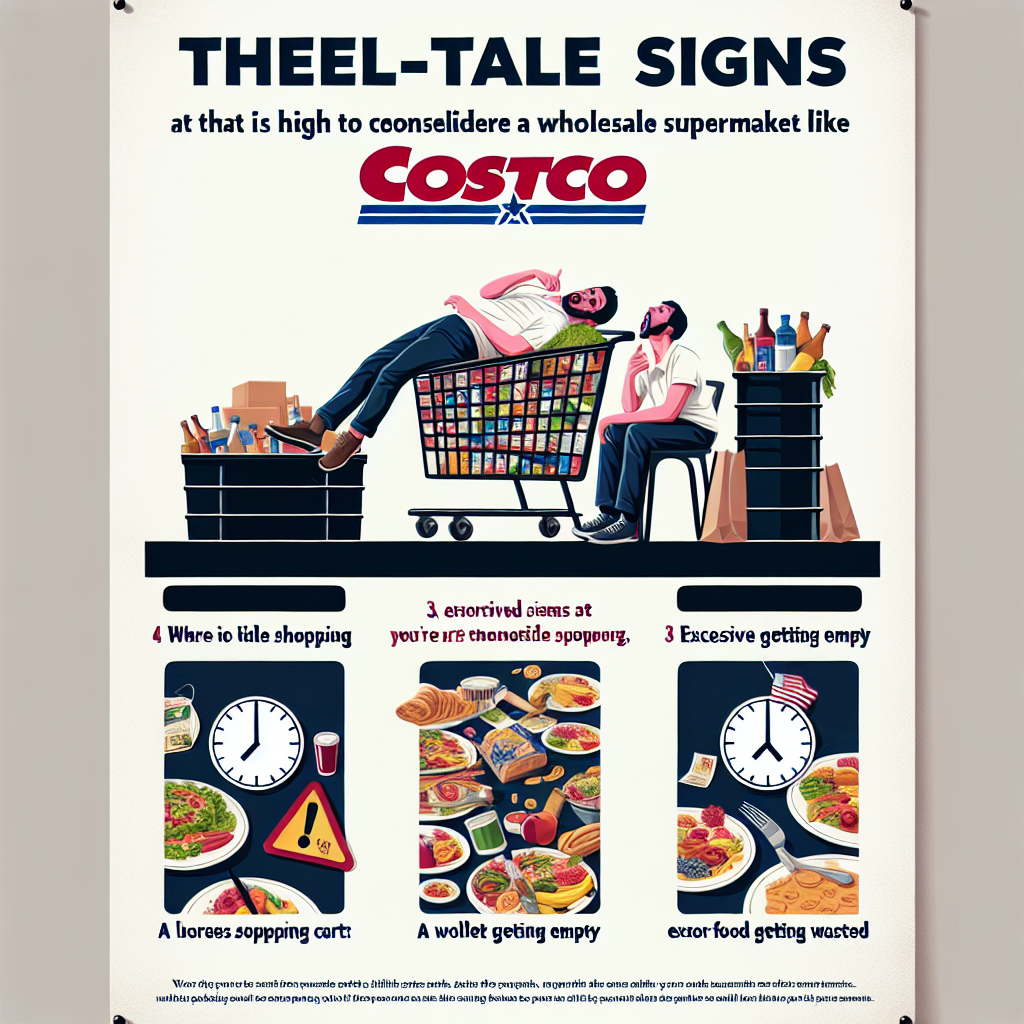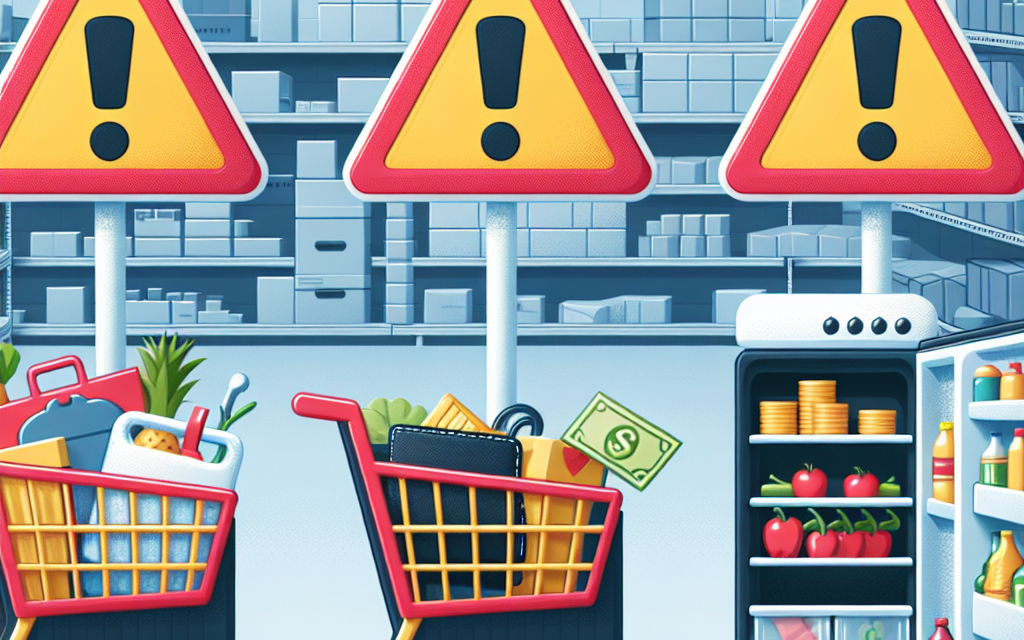“Spot the Signs: When Your Costco Cart Needs a Makeover!”
Introduction
Costco, renowned for its bulk offerings and competitive prices, has become a staple for many households seeking value and convenience. However, even the most seasoned Costco shoppers may find themselves in need of a strategy reassessment. Recognizing the subtle indicators that your shopping habits may require a tweak is crucial to maintaining both financial efficiency and household harmony. Here are three warning signs that suggest it might be time to rethink your Costco shopping habits, ensuring that your trips to the warehouse giant remain beneficial and aligned with your needs.
Recognizing Overspending: When Your Costco Bill Keeps Climbing
Costco, renowned for its bulk offerings and competitive prices, has become a staple for many households seeking to maximize their purchasing power. However, the allure of bulk buying can sometimes lead to unintended financial consequences. Recognizing when your Costco shopping habits may be contributing to overspending is crucial for maintaining a balanced budget. As your Costco bill continues to climb, it is essential to identify the warning signs that suggest it might be time to rethink your approach to shopping at this retail giant.
Firstly, one of the most telling indicators of overspending at Costco is the accumulation of unused or expired products. While buying in bulk can be cost-effective, it is only beneficial if the items purchased are used before they go bad. If you find yourself frequently discarding expired goods or struggling to find space for your purchases, it may be a sign that you are buying more than you need. This not only leads to waste but also negates the financial savings initially sought. To address this, consider creating a shopping list before each visit and sticking to it, ensuring that you only purchase items that you are certain will be consumed within a reasonable timeframe.
Another warning sign is the tendency to purchase non-essential items simply because they are on sale or appear to be a good deal. Costco is known for its enticing promotions and seasonal offerings, which can make it difficult to resist the temptation of buying items that were not originally on your shopping list. If you notice that your cart is consistently filled with impulse buys, it may be time to reassess your shopping strategy. One effective approach is to set a budget for each trip and prioritize essential items over discretionary purchases. By doing so, you can enjoy the benefits of Costco’s savings without falling into the trap of overspending on unnecessary products.
Moreover, if you find that your monthly grocery expenses have increased significantly since you started shopping at Costco, it may be an indication that your spending habits need to be reevaluated. While Costco offers competitive prices, the sheer volume of products available can lead to higher overall spending if not managed carefully. To mitigate this, consider tracking your grocery expenses over a few months to identify patterns and areas where you may be overspending. This can provide valuable insights into your shopping habits and help you make more informed decisions about future purchases.
In addition to these warning signs, it is important to consider the impact of frequent Costco trips on your overall financial health. If you find that your visits to Costco are becoming more frequent and your spending is consistently exceeding your budget, it may be time to explore alternative shopping options. This could include supplementing your Costco trips with visits to local grocery stores for smaller, more frequent purchases that better align with your consumption patterns.
In conclusion, while Costco offers numerous benefits for savvy shoppers, it is essential to remain vigilant about your spending habits to avoid the pitfalls of overspending. By recognizing the warning signs of unused products, impulse buying, and increased grocery expenses, you can take proactive steps to ensure that your Costco shopping experience remains both enjoyable and financially sustainable. Through careful planning and mindful purchasing, you can continue to reap the rewards of bulk buying without compromising your budget.
Storage Struggles: Signs You’re Running Out of Space for Bulk Buys
When it comes to shopping at Costco, the allure of bulk buying is undeniable. The promise of saving money while stocking up on essentials is a compelling reason for many to frequent the warehouse giant. However, there comes a point when the convenience of bulk purchases can turn into a logistical nightmare, particularly when storage space becomes a pressing concern. Recognizing the warning signs that indicate it’s time to rethink your Costco shopping habits can save you from unnecessary clutter and stress.
One of the most apparent signs that your bulk buying habits may need reassessment is the constant struggle to find space for your purchases. If you find yourself rearranging your pantry or garage every time you return from a shopping trip, it might be time to reconsider the volume of items you’re bringing home. While it is tempting to take advantage of discounts on large quantities, the lack of adequate storage can lead to disorganization and even spoilage of perishable goods. This not only negates the financial benefits of buying in bulk but also contributes to waste, which is counterproductive to the initial goal of saving money.
Moreover, another indicator that your storage capacity is being stretched to its limits is the presence of items in unconventional places. When you start storing toilet paper in the bedroom closet or canned goods under the bed, it is a clear sign that your home is not equipped to handle the influx of bulk items. This can lead to a cluttered living environment, which may affect your overall quality of life. A cluttered home can increase stress levels and make it difficult to maintain a clean and organized space. Therefore, it is crucial to evaluate whether the convenience of having a stockpile is worth the potential disruption to your living environment.
In addition to physical storage challenges, the financial implications of over-purchasing should not be overlooked. While buying in bulk can offer significant savings, it can also lead to overspending if not managed carefully. If you notice that a significant portion of your monthly budget is being allocated to bulk purchases, it may be time to reassess your shopping strategy. Consider whether you are buying items simply because they are on sale or if they are genuinely needed. This reflection can help you make more informed decisions and prevent unnecessary financial strain.
Furthermore, it is essential to consider the impact of your shopping habits on your household dynamics. If family members or roommates frequently express frustration over the lack of space or the abundance of unnecessary items, it may be a sign that your bulk buying is affecting more than just your storage capacity. Open communication with those you live with can provide valuable insights into how your shopping habits are impacting the household and can guide you in making adjustments that benefit everyone.
In conclusion, while Costco offers undeniable benefits for those looking to save money through bulk buying, it is crucial to remain mindful of the potential drawbacks. By recognizing the warning signs of storage struggles, such as constant rearranging, unconventional storage solutions, financial strain, and household tension, you can make more informed decisions about your shopping habits. Ultimately, finding a balance between taking advantage of bulk discounts and maintaining a harmonious living environment is key to ensuring that your Costco shopping experience remains a positive one.
Expiry Anxiety: When Food Waste Becomes a Regular Occurrence
Shopping at Costco can be an exhilarating experience, offering the allure of bulk purchases and the promise of savings. However, the excitement of stocking up on essentials can sometimes lead to unintended consequences, particularly when it comes to food waste. Expiry anxiety, the stress associated with food nearing its expiration date, is a common issue among bulk shoppers. Recognizing the warning signs that it’s time to rethink your Costco shopping habits can help mitigate this problem and promote more sustainable consumption.
Firstly, one of the most telling signs that your shopping habits need adjustment is the frequent discovery of expired or spoiled food in your pantry or refrigerator. This occurrence not only signifies wasted money but also highlights a disconnect between purchasing habits and actual consumption needs. When food waste becomes a regular occurrence, it is essential to reassess the quantities being purchased. While buying in bulk can be economical, it is crucial to ensure that the volume aligns with your household’s consumption rate. By doing so, you can reduce the likelihood of food expiring before it is used, thereby minimizing waste and maximizing savings.
Moreover, another indicator that it may be time to reconsider your approach is the persistent feeling of being overwhelmed by the sheer volume of products stored at home. This sensation often stems from purchasing items in quantities that exceed storage capacity or immediate needs. When storage spaces become cluttered, it can lead to disorganization, making it difficult to keep track of what is available and what needs to be consumed first. To address this issue, consider implementing a more strategic approach to shopping, such as creating a detailed inventory of existing supplies before heading to Costco. This practice can help identify what truly needs replenishing and prevent unnecessary purchases that contribute to clutter and potential waste.
In addition to these practical concerns, a third warning sign is the emotional toll that expiry anxiety can take. Constantly worrying about food going bad can lead to stress and guilt, detracting from the enjoyment of meals and the satisfaction of a well-stocked kitchen. This emotional burden can be alleviated by adopting a more mindful shopping strategy. For instance, planning meals in advance and purchasing only the ingredients required for those meals can help ensure that food is used efficiently and waste is minimized. Additionally, exploring creative ways to use leftovers or repurpose ingredients nearing their expiration date can transform potential waste into culinary opportunities.
Ultimately, recognizing these warning signs and taking proactive steps to address them can lead to a more sustainable and satisfying shopping experience. By aligning purchases with actual needs, organizing storage spaces effectively, and adopting mindful consumption practices, you can reduce food waste and alleviate expiry anxiety. In doing so, not only will you contribute to a more sustainable environment, but you will also enhance your overall shopping experience, ensuring that each trip to Costco is both economical and enjoyable.
Impulse Buying: How to Identify and Control Unplanned Purchases

Impulse buying is a common phenomenon that many shoppers experience, particularly in large retail environments like Costco. While the allure of bulk discounts and exclusive deals can be enticing, it’s crucial to recognize when these unplanned purchases begin to impact your financial well-being. Understanding the warning signs of impulse buying can help you regain control over your shopping habits and make more informed decisions.
One of the first indicators that your Costco shopping habits may need reevaluation is the frequency of unplanned purchases. If you find yourself consistently leaving the store with items that were not on your shopping list, it may be time to assess your buying behavior. This pattern often stems from the strategic placement of products and enticing displays designed to capture your attention. To counteract this, consider creating a detailed shopping list before entering the store and commit to sticking to it. By doing so, you can reduce the likelihood of succumbing to impulse buys and ensure that your purchases align with your actual needs.
Another warning sign is the accumulation of unused or unnecessary items at home. If your pantry or storage areas are filled with products that remain untouched long after purchase, it may indicate that impulse buying is driving your shopping decisions. This not only leads to wasted money but also contributes to clutter and inefficiency in your living space. To address this issue, take inventory of your current stock before heading to Costco. By understanding what you already have, you can avoid purchasing duplicates or items that are unlikely to be used in the near future. Additionally, consider setting a budget for each shopping trip to help prioritize essential items over spontaneous purchases.
A third sign that it might be time to rethink your Costco shopping habits is the emotional response associated with shopping. If you notice that your trips to the store are often driven by stress, boredom, or the desire for instant gratification, it may be indicative of impulse buying behavior. Retail therapy can provide a temporary mood boost, but it often leads to regret and financial strain in the long run. To mitigate this, try to identify the underlying emotions that trigger your shopping impulses and seek alternative ways to address them. Engaging in activities such as exercise, meditation, or spending time with loved ones can provide more sustainable emotional fulfillment without the financial consequences.
In conclusion, recognizing the warning signs of impulse buying is essential for maintaining healthy shopping habits at Costco. By being mindful of the frequency of unplanned purchases, the accumulation of unused items, and the emotional triggers associated with shopping, you can take proactive steps to regain control over your spending. Implementing strategies such as creating a shopping list, taking inventory of existing supplies, and setting a budget can help you make more intentional purchasing decisions. Ultimately, by addressing these behaviors, you can enjoy the benefits of shopping at Costco without falling victim to the pitfalls of impulse buying.
Membership Value: Assessing If You’re Getting Your Money’s Worth
When considering the value of a Costco membership, it is essential to evaluate whether the benefits align with your shopping habits and financial goals. While Costco is renowned for offering bulk products at competitive prices, not every shopper may find the membership fee justifiable. Recognizing the warning signs that indicate it might be time to reassess your Costco shopping habits can help ensure you are making the most of your membership.
Firstly, one of the most telling signs that it might be time to rethink your Costco membership is if you find yourself visiting the store infrequently. The annual membership fee, which grants access to Costco’s exclusive deals and bulk purchasing options, is only worthwhile if you are a regular shopper. If you notice that your trips to Costco are becoming sporadic or that you are not taking full advantage of the membership benefits, it may be time to reconsider whether the cost is justified. Infrequent visits can lead to missed opportunities for savings, ultimately diminishing the value of the membership.
Moreover, another indicator that it might be time to reassess your Costco shopping habits is if you consistently purchase items that go to waste. Buying in bulk can be advantageous for families or individuals who consume large quantities of specific products. However, if you find that perishable items are expiring before they are used or that non-perishable goods are accumulating without being consumed, it may be a sign that bulk purchasing is not suitable for your lifestyle. This not only results in wasted money but also contributes to unnecessary waste, which can be both financially and environmentally detrimental.
Additionally, it is crucial to evaluate whether the products you purchase at Costco are genuinely offering savings compared to other retailers. While Costco is known for its competitive pricing, it is not always the cheapest option for every product. Conducting a price comparison with other local stores or online retailers can provide insight into whether you are truly benefiting from Costco’s pricing model. If you discover that similar or better deals are available elsewhere, it may be time to reconsider the necessity of maintaining a Costco membership.
Furthermore, it is important to consider whether the non-shopping benefits of a Costco membership, such as access to discounted services and travel deals, are being utilized. These additional perks can enhance the value of a membership, but only if they are relevant to your needs and lifestyle. If you find that you are not taking advantage of these offerings, it may be worth evaluating whether the membership fee is justified solely based on your shopping habits.
In conclusion, assessing the value of a Costco membership requires a careful examination of your shopping frequency, purchasing habits, and the comparative savings offered by the store. By identifying these warning signs, you can make an informed decision about whether to continue or reconsider your membership. Ultimately, ensuring that your Costco membership aligns with your financial goals and lifestyle needs will help you maximize its value and avoid unnecessary expenses.
Time Management: When Shopping Trips Take Longer Than Expected
In today’s fast-paced world, time management is a crucial skill that can significantly impact our daily lives. For many, shopping at Costco is a routine that promises savings and convenience. However, when these shopping trips begin to take longer than expected, it may be time to reassess your approach. One of the first warning signs that your Costco shopping habits need reevaluation is when you find yourself spending excessive time navigating the aisles. While Costco is known for its vast selection of products, this abundance can sometimes lead to overwhelming experiences. If you notice that your trips are consistently extending beyond your planned schedule, it might be beneficial to consider creating a more structured shopping list. By doing so, you can focus on purchasing only the items you truly need, thereby reducing the time spent wandering through the store.
Another indicator that it may be time to rethink your Costco shopping habits is when you frequently encounter long checkout lines. While some delays are inevitable, consistently facing lengthy waits can be a sign that your timing is off. To mitigate this issue, consider adjusting the time of day or week you choose to shop. Early mornings or weekdays often present less crowded conditions, allowing for a more efficient shopping experience. Additionally, exploring the option of self-checkout lanes, if available, can further expedite the process. By strategically planning your visits, you can minimize the time spent waiting and maximize your overall efficiency.
Furthermore, if you find that your Costco trips are leading to unplanned purchases, it may be time to reassess your shopping strategy. Impulse buying is a common pitfall, especially in a store that offers a wide array of tempting products. These unplanned purchases not only extend the duration of your shopping trip but can also lead to budgetary concerns. To combat this, it is advisable to set a clear budget before entering the store and adhere to it strictly. This financial discipline will not only save you time but also ensure that your shopping habits align with your financial goals.
In addition to these practical strategies, it is essential to periodically evaluate the necessity of each Costco trip. If you find that your visits are becoming more frequent without a corresponding increase in essential purchases, it may be time to reconsider the frequency of your trips. By consolidating your shopping needs into fewer visits, you can save both time and energy. This approach not only streamlines your shopping routine but also allows for more effective time management in other areas of your life.
Ultimately, recognizing these warning signs and taking proactive steps to address them can lead to a more efficient and enjoyable shopping experience at Costco. By implementing strategies such as creating a structured shopping list, adjusting your shopping schedule, adhering to a budget, and consolidating trips, you can optimize your time management skills and ensure that your Costco visits are both productive and time-efficient. In doing so, you will not only enhance your shopping experience but also free up valuable time for other important activities in your life.
Budget Blunders: How to Spot and Fix Financial Strain from Bulk Shopping
Shopping at Costco can be a savvy way to save money, especially for families or individuals who prefer buying in bulk. However, the allure of bulk shopping can sometimes lead to financial strain if not managed carefully. Recognizing the warning signs that it’s time to rethink your Costco shopping habits is crucial for maintaining a healthy budget. By identifying these signs early, you can make necessary adjustments to ensure that your bulk shopping remains a benefit rather than a burden.
One of the first warning signs that your Costco shopping habits may need reevaluation is the accumulation of unused or expired products. While buying in bulk can offer significant savings per unit, it is only cost-effective if the products are used before they expire. If you find yourself frequently discarding expired items or struggling to find space for your purchases, it may be time to reconsider the quantities you are buying. This issue often arises from the temptation to purchase items simply because they are on sale or because the bulk price seems too good to pass up. To address this, consider creating a shopping list before each trip and sticking to it, ensuring that you only buy what you truly need and can realistically consume.
Another indicator that your Costco shopping habits might be causing financial strain is an increase in credit card debt. Bulk shopping can lead to larger upfront costs, which, if not managed properly, can result in carrying a balance on your credit card. This can quickly negate any savings achieved through bulk purchasing due to the high interest rates associated with credit card debt. If you notice that your credit card balance is consistently higher after shopping trips or that you are struggling to pay off your balance in full each month, it may be time to reassess your spending habits. Setting a budget for each shopping trip and using cash or a debit card can help you stay within your means and avoid unnecessary debt.
Furthermore, if you find that your overall grocery spending has increased despite shopping at Costco, this could be a sign that your habits need adjustment. While bulk shopping is intended to reduce costs, it can sometimes lead to over-purchasing and impulse buying, which can inflate your grocery bill. To combat this, it is important to track your spending over time and compare it to your budget. If you notice a trend of overspending, consider evaluating the types of products you are buying in bulk and whether they are truly necessary. Additionally, it may be beneficial to compare prices with other retailers to ensure that you are getting the best deal.
In conclusion, while Costco can be a valuable resource for budget-conscious shoppers, it is essential to remain vigilant about your shopping habits to avoid financial strain. By recognizing the warning signs of unused products, increasing credit card debt, and rising grocery costs, you can take proactive steps to adjust your approach to bulk shopping. Implementing strategies such as creating a shopping list, setting a budget, and tracking your spending can help you maintain control over your finances and continue to enjoy the benefits of shopping at Costco without the associated pitfalls.
Q&A
1. **Question:** What is a sign that you might be overspending at Costco?
**Answer:** If you consistently exceed your budget or find yourself buying items you don’t need, it may be a sign to rethink your shopping habits.
2. **Question:** How can buying in bulk at Costco become a problem?
**Answer:** Buying in bulk can lead to waste if you purchase perishable items that expire before you can use them.
3. **Question:** What is an indication that you might be visiting Costco too frequently?
**Answer:** If you find yourself making multiple trips per week, it might be time to reassess your shopping frequency.
4. **Question:** How can impulse buying affect your Costco shopping habits?
**Answer:** Impulse buying can lead to unnecessary purchases, clutter, and financial strain.
5. **Question:** What should you consider if you notice you’re not using your Costco membership benefits?
**Answer:** If you’re not taking advantage of the membership perks, it might be worth reconsidering the value of your membership.
6. **Question:** Why is it important to evaluate your storage space when shopping at Costco?
**Answer:** Limited storage space can lead to clutter and difficulty managing bulk purchases, indicating a need to rethink your shopping strategy.
7. **Question:** How can comparing prices help in rethinking your Costco shopping habits?
**Answer:** Regularly comparing prices with other retailers can ensure you’re getting the best deals and help prevent overspending.
Conclusion
If you’re noticing that your Costco shopping trips are consistently leading to overspending, excessive waste due to bulk purchases, or a lack of variety in your diet, it may be time to reassess your shopping habits. These warning signs suggest that the convenience and savings of buying in bulk might not be aligning with your actual needs and lifestyle. By reevaluating your approach, you can make more mindful purchasing decisions that better suit your budget, reduce waste, and enhance your overall shopping experience.





